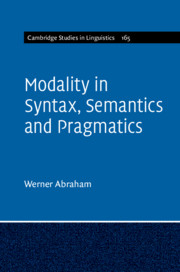Book contents
- Modality in Syntax, Semantics, and Pragmatics
- Cambridge Studies in Linguistics
- Modality in Syntax, Semantics, and Pragmatics
- Copyright page
- Dedication
- Contents
- Tables
- Preface
- Acknowledgments
- Abbreviations and Special Symbols
- Introduction
- I Modes of Modality
- II Verbal Modality
- 4 The Syntax–Semantic–Pragmatic Interface of Modal Verbs
- 5 The Perspectival Specifics of Verb Modality in German
- 6 The Syntax of Modal Verbs in German, Dutch, and English
- 7 Modal Verb Semantics
- III Adverbial Modality
- IV Covert Modality
- Bibliography
- Index
4 - The Syntax–Semantic–Pragmatic Interface of Modal Verbs
from II - Verbal Modality
Published online by Cambridge University Press: 06 February 2021
- Modality in Syntax, Semantics, and Pragmatics
- Cambridge Studies in Linguistics
- Modality in Syntax, Semantics, and Pragmatics
- Copyright page
- Dedication
- Contents
- Tables
- Preface
- Acknowledgments
- Abbreviations and Special Symbols
- Introduction
- I Modes of Modality
- II Verbal Modality
- 4 The Syntax–Semantic–Pragmatic Interface of Modal Verbs
- 5 The Perspectival Specifics of Verb Modality in German
- 6 The Syntax of Modal Verbs in German, Dutch, and English
- 7 Modal Verb Semantics
- III Adverbial Modality
- IV Covert Modality
- Bibliography
- Index
Summary
This chapter revolves around the context dependent shifts between root and epistemic modality. Perfective contextual aspect triggers modal root (deontic) readings, imperfect contextual aspect elicits epistemic or evidential readings. Different scopes of negation are considered. It is shown with material from German that epistemic and evidential interpretations are different on several criteria. Person origo is responsible for an epistemic differential.
Keywords
- Type
- Chapter
- Information
- Modality in Syntax, Semantics and Pragmatics , pp. 107 - 131Publisher: Cambridge University PressPrint publication year: 2020

